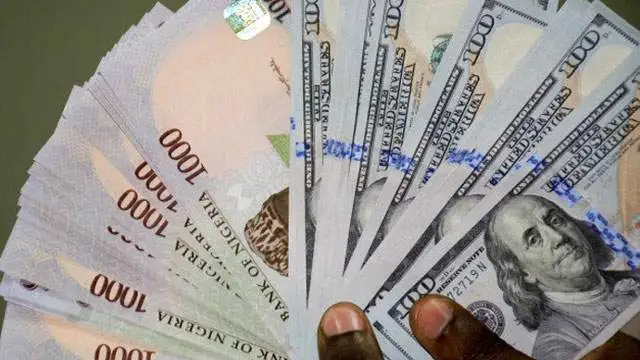Naira Slumps to N1,410/$ in Parallel Market: Currency Update
Yesterday, the Nigerian Naira experienced contrasting fortunes in the foreign exchange markets. While it depreciated to N1,410 per dollar in the parallel market, it appreciated in the Nigerian Foreign Exchange Market (NAFEM), reaching N1,354.21 per dollar.
Data from the FMDQ revealed that the indicative exchange rate for NAFEM climbed to N1,354.21 per dollar, marking a significant appreciation of N46.19 compared to the N1,400.4 per dollar recorded the previous Friday. This positive movement signals an improvement in the value of the Naira against the dollar.
Throughout the trading day, the market witnessed fluctuations, with the exchange rate reaching an intraday high of N1,441 per dollar and an intraday low of N1,285 per dollar. This fluctuation resulted in a margin of N156 per dollar, indicating volatility in the market.
Despite the fluctuations, the volume of dollars traded (turnover) in the market decreased by 58 percent, falling to $84.83 million from $201.88 million traded the previous day. This decline suggests reduced trading activity in the foreign exchange market.
Due to these developments, the margin between the parallel market and NAFEM rates widened to N55.79 per dollar, a significant increase from the N5.4 per dollar recorded the previous Friday. This widening gap reflects the divergence in exchange rates between the two markets and highlights the challenges of currency valuation in Nigeria.
Addressing the challenges in the foreign exchange market requires a comprehensive approach that includes policy reforms, increased transparency, and efforts to boost investor confidence. The CBN and relevant authorities must continue implementing measures to enhance liquidity, curb speculation, and promote a stable and unified exchange rate system.
Additionally, broader economic reforms are needed to diversify the economy, reduce dependence on oil exports, and promote non-oil sectors to boost foreign exchange earnings and reduce vulnerabilities to external shocks.
Overall, achieving stability and convergence in Nigeria’s foreign exchange market remains critical for sustaining economic growth, attracting investment, and ensuring macroeconomic stability.



















